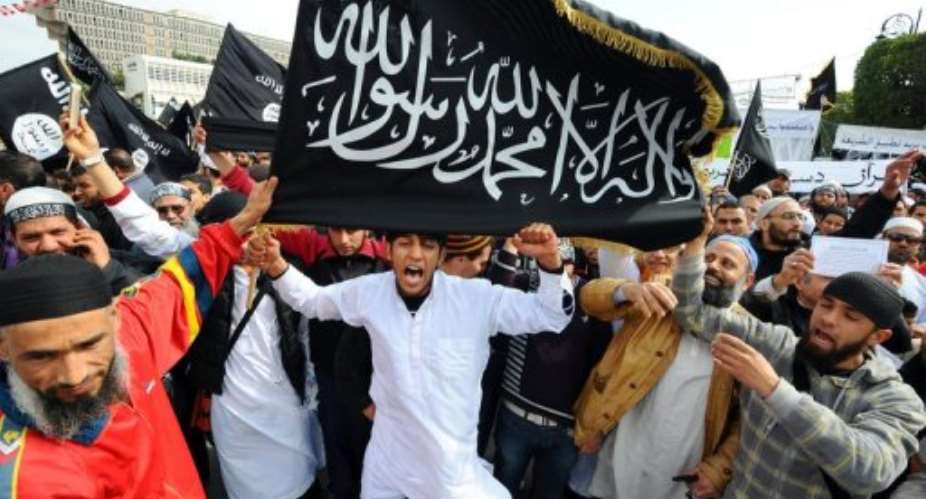TUNIS (AFP) - Tunisia's Religious Affairs Minister Nourredine al-Khademi on Saturday said the country will take stock of the hundreds of mosques now in the hands of Salafist extremists.
"This is a priority area for my administration," said the minister, who estimated that about 400 of Tunisia's more than 5,000 mosques had fallen under the sway of ultra-conservative Salafists.
"Serious problems concern about 50 mosques, no more," he said, referring to cases where the original imams and worshippers had been forced out.
Khademi said that in the central city of Sidi Bouzid, for example, a major mosque was taken over by Salafists more than a year ago and was now known by locals as the "Kandahar mosque", after Afghanistan's Taliban stronghold.
"Hundreds of other places of worship are experiencing administrative problems: no imam or muezzin, no administrator," said Khademi, himself an imam at the El Fateh mosque in Tunis, site of frequent Salafist protests.
A popular uprising in Tunisia early last year ousted long-standing dictator Zine el Abidine Ben Ali's regime and set off the Arab Spring. The moderate Islamist Ennahda party won October 2011 elections.
However, Salafists, formerly banned, have become vocal, demanding that sharia or Islamic law form the basis of a new constitution.
Some secular and liberal groups have reacted angrily to the surge by religious hardliners, arguing that the democratic gains achieved by the January 2011 revolt risk being rolled back.
The religious affairs minister said his ministry has prepared to make an inventory of all the country's mosques, and a 20-member "Committee of Wise Men" to be chaired by the minister would be announced next week.
This commission -- to include imams, Islamic university lecturers and humanities teachers -- will be tasked with compiling the inventory.
"We are also looking at the recruitment of imams, who now have to hold at least a master's degree, preferably in Islamic studies, have a general education in the humanities, an openness to other religions, and be known for their morality in their neighborhood," said the minister.
By Ramadan -- the Muslim holy month, expected to start this year on July 20 -- "calm will have returned in our mosques," he said.
One of the Salafist leaders, Seif Allah Ben Hassine, insisted this week that the movement does not preach violence.
He said Tunisia "is not a land of jihad, but it is a land of religious preaching," according to the Friday edition of Tunisian daily Le Temps.
"We do not preach violence. All our actions may be summarized now in the moral preaching and works of charity," said Ben Hassine, known as Abu Yadh and considered one of the top leaders of the most radical Salafists.
Released during a post-revolution amnesty, Abu Yadh is the co-founder in 2000 of the Tunisian Fighting Group, which was listed in 2002 by the UN Security Council as linked to Al-Qaeda.
Abu Yadh fought in Afghanistan and was arrested in 2003 in Turkey, before being extradited and sentenced to 43 years jail by the regime of Ben Ali.
"I am certain that Tunisia is not a land of jihad, but that it is a land of religious preaching... We only want good for our country and our countrymen," said Abu Yadh, adding that "the Salafist bogey" has been used to frighten the Tunisian people.





 We’ll protect state wealth from opaque deals – Prof Jane Naana
We’ll protect state wealth from opaque deals – Prof Jane Naana
 Mauritania president says running for second term in June polls
Mauritania president says running for second term in June polls
 I won't ever say I was a mere driver’s mate' — Prof. Opoku-Agyemang
I won't ever say I was a mere driver’s mate' — Prof. Opoku-Agyemang
 2024 polls: 'EC struggling to defend credibility'— Prof. Opoku-Agyemang
2024 polls: 'EC struggling to defend credibility'— Prof. Opoku-Agyemang
 Akufo-Addo gov't's 'greed, unbridled arrogance, unrestrained impunity, sheer dis...
Akufo-Addo gov't's 'greed, unbridled arrogance, unrestrained impunity, sheer dis...
 Election 2024: Ghana needs an urgent reset, a leadership that is inspiring – Ma...
Election 2024: Ghana needs an urgent reset, a leadership that is inspiring – Ma...
 Partner NDC to rollout a future of limitless prospects – Prof Jane Naana Opoku-A...
Partner NDC to rollout a future of limitless prospects – Prof Jane Naana Opoku-A...
 NPP will remain in gov’t till Jesus comes — Diana Asamoah
NPP will remain in gov’t till Jesus comes — Diana Asamoah
 Sunyani Technical University demands apology from former SRC president over sex-...
Sunyani Technical University demands apology from former SRC president over sex-...
 'Dumsor' was resolved by Mahama but ‘incompetent' Akufo-Addo has destroyed the g...
'Dumsor' was resolved by Mahama but ‘incompetent' Akufo-Addo has destroyed the g...
